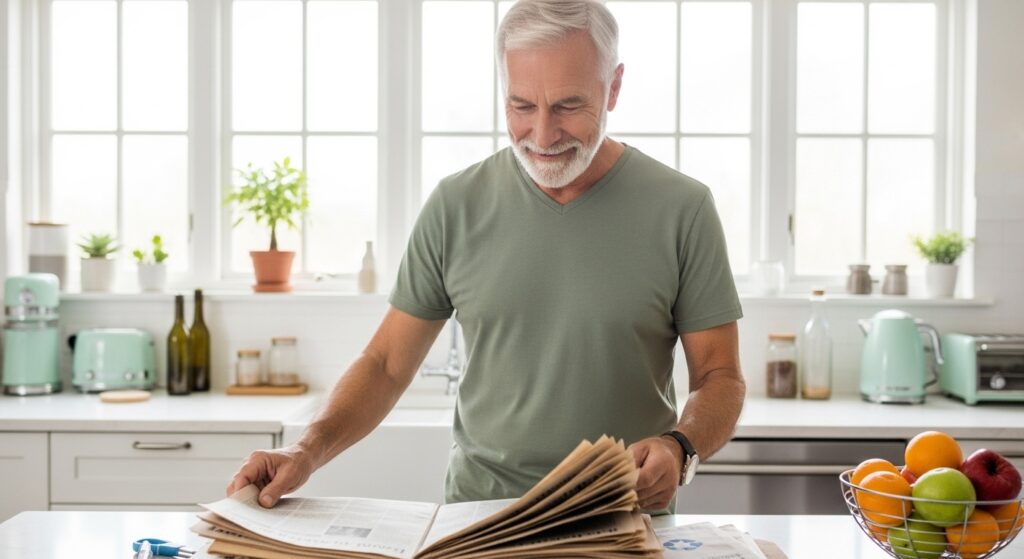As we get older, simple tasks like house cleaning can become more challenging. Seniors often face physical limitations, such as less strength or mobility, which can make cleaning feel tiring or even unsafe. Health issues or memory challenges can also add to the difficulty of keeping a home tidy. Despite these obstacles, maintaining a clean and safe home is crucial for comfort, health, and independence.
This article offers practical, easy-to-follow house cleaning tips for seniors. These strategies focus on making cleaning manageable and safe, helping you or your loved ones enjoy a fresher, more organized living space without overwhelming effort.
Making a Cleaning Plan for Seniors
Keeping your home clean can feel overwhelming, especially with the challenges that come with age like reduced energy or mobility. That’s why making a cleaning plan is so important. Planning and scheduling your cleaning tasks can help break the job into smaller, manageable parts. Instead of trying to do everything at once, you can focus on simple daily or weekly sessions, making the process easier and less tiring.
Prioritize your chores based on how difficult or risky they are. For example, save heavier or more complicated tasks for days when you feel strongest, or ask for help when needed. This way, you can keep your home safe and tidy without feeling overwhelmed or risking injury. From my experience, setting a clear plan not only helps keep the house clean but also gives a great sense of control and peace of mind.
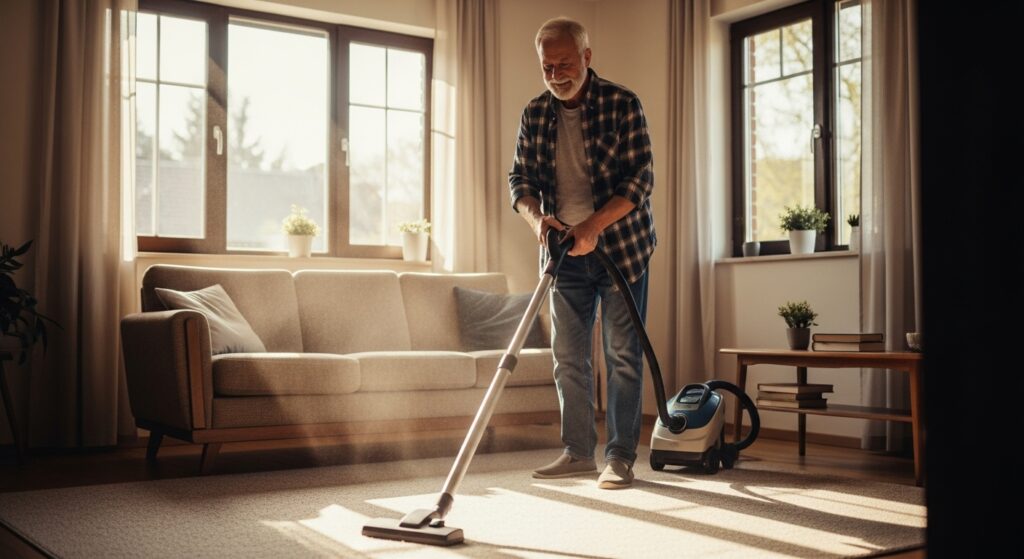
Use Manageable Cleaning Tools and Methods
Using the right tools can make a big difference in how easy and safe house cleaning feels for seniors. Lightweight and ergonomic tools, like those with extendable handles, help you clean hard-to-reach places without bending or stretching too much. Devices such as robotic vacuums can do the heavy work for you, so you don’t have to spend energy pushing or pulling heavy equipment.
Simple items like microfiber cloths are also great because they clean well without much effort and reduce the need for harsh scrubbing. To reduce physical strain during cleaning, take breaks often, work in small sections, and focus on one task at a time. These tips help keep cleaning manageable and protect your body from overexertion.
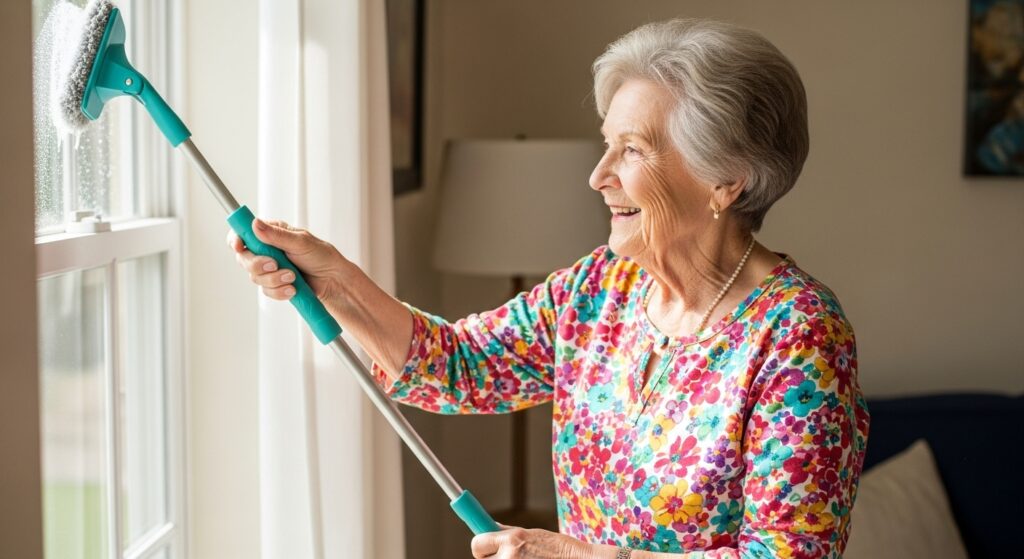
Prioritize Safety While Cleaning
Safety should always come first, especially when seniors are cleaning their homes. It’s important to wear non-slip shoes to avoid slipping on wet floors and to keep walkways clear of clutter to prevent tripping hazards. Using tools like a grabber or a duster with an extendable handle means you don’t have to climb ladders or stretch too far, reducing the risk of falls.
Make sure rooms are well-lit so you can see clearly and avoid accidents. Taking regular breaks helps prevent fatigue, which can lead to mistakes or injuries. Keeping heavy items at waist level and using safety gear such as handrails or rubber mats in slippery areas will also make cleaning safer and easier. Remember, it’s okay to ask for help if a task feels risky or too hard to do alone.
Regular Cleaning Habits to Prevent Clutter
Keeping your home tidy every day makes cleaning much easier and helps prevent clutter buildup. Simple habits like putting items away immediately after use and wiping surfaces regularly can save time and effort in the long run. When things have their own place, it’s easier to keep your space neat and safe.
Regular tidiness also helps seniors avoid tripping hazards and creates a more comfortable living environment. By making small daily routines part of your lifestyle, you reduce the need for big, exhausting cleaning sessions. Staying organized not only keeps your home looking good but also supports your safety and peace of mind.
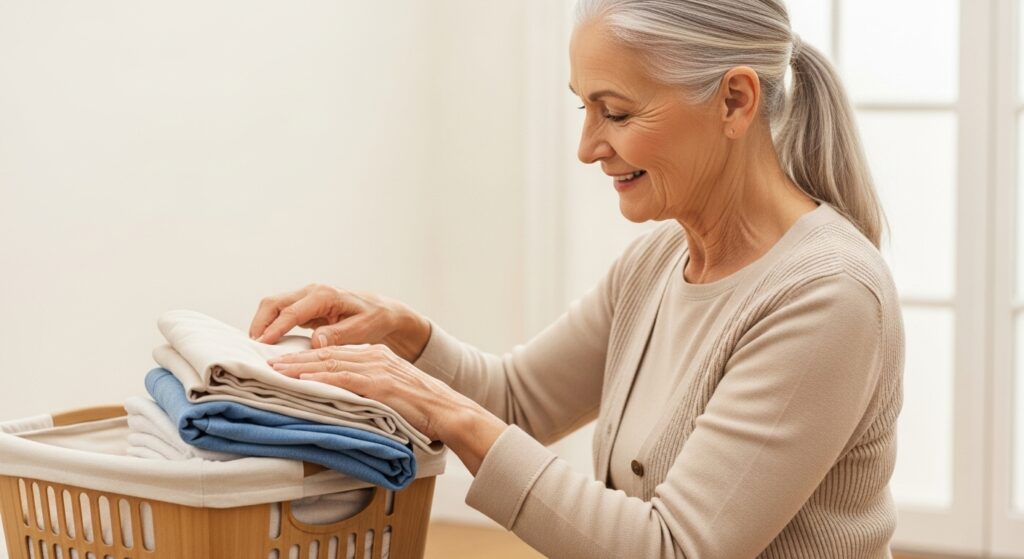
Safety First: Avoiding Accidents While Cleaning
When cleaning, wear non-slip shoes and make sure there is good lighting so you can see clearly and avoid accidents. Instead of climbing ladders or stools, use grabber tools with extendable handles to reach high or hard-to-get places safely. It’s important to keep pathways clear of obstacles to prevent tripping and falls.
Remember to take breaks regularly to avoid overexertion and fatigue, which can increase the risk of accidents. Prioritizing safety makes cleaning less stressful and helps seniors maintain their independence while keeping their home clean.
Declutter and Organize for Easier Cleaning
Sorting through your belongings can make cleaning much easier and safer. Use the simple method of deciding what to keep, donate, or discard to reduce clutter. Keeping only what’s necessary and meaningful helps create more space and reduces tripping hazards.
Organize your items by setting up designated spots for frequently used things so they are easy to find and put away. This habit not only saves time but also helps seniors maintain a tidy and manageable living space with less effort.
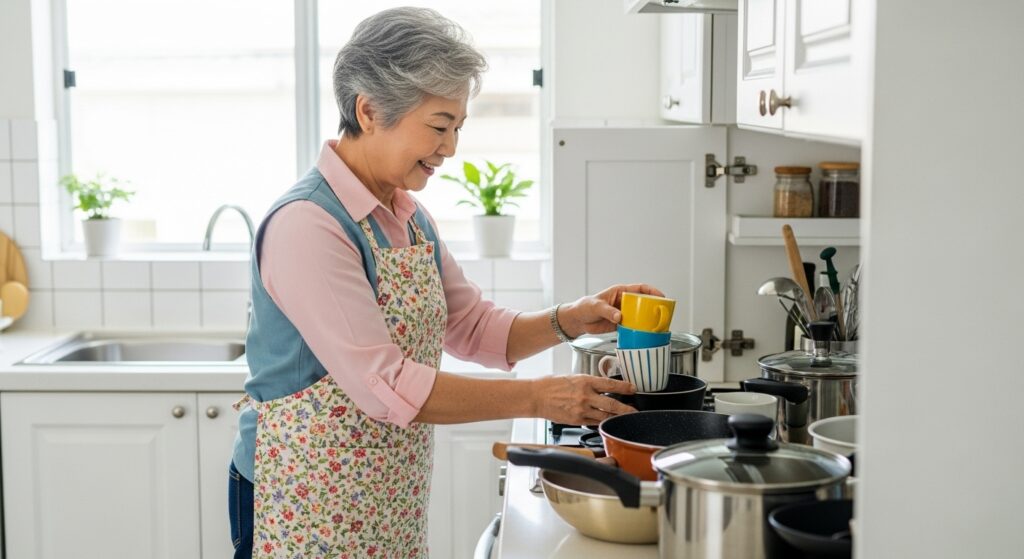
Focus on High-Traffic and High-Touch Areas
Pay special attention to areas in your home that get the most use. Regularly clean and disinfect doorknobs, light switches, countertops, and frequently touched surfaces to reduce the spread of germs and keep your home hygienic. Floors, chairs, and other common furniture should also be kept clean, as they often collect dust and dirt.
By focusing on these key spots, you improve the overall cleanliness and safety of your home. This helps prevent illness and makes daily living more comfortable for seniors.
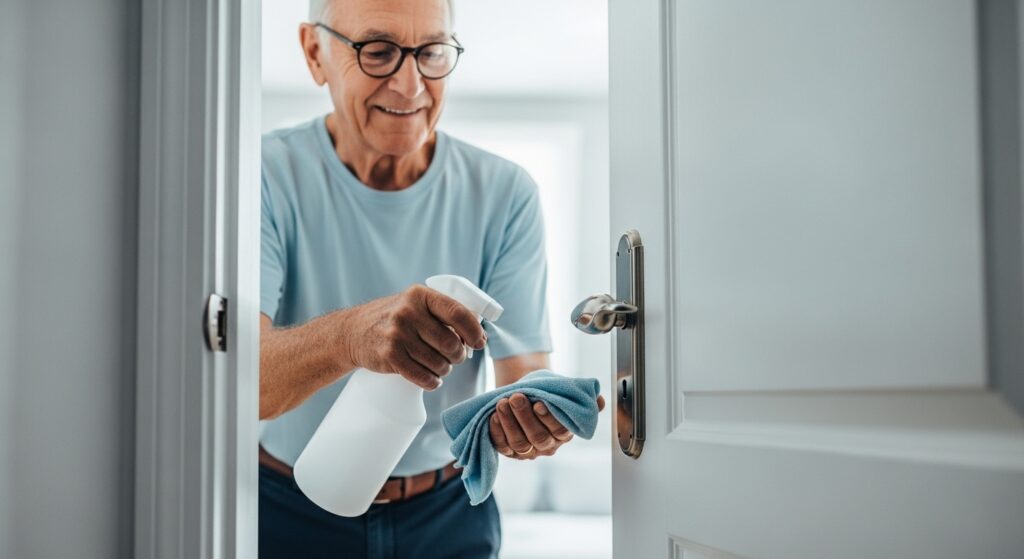
Deep Clean Key Areas Periodically
Every now and then, your home will need a more thorough cleaning to keep it fresh and healthy. Focus on key areas like the kitchen, where the refrigerator, pantry, stove, and dishwasher should be cleaned regularly to prevent buildup and odors. In the bathroom, pay attention to scrubbing the grout, shower, toilet, and mirrors to stop mold and mildew growth.
Don’t forget the living spaces—clean upholstery, carpets, and blinds to remove dust and allergens. Doing these deep cleaning tasks periodically will help maintain a safe and comfortable environment, especially important for seniors.
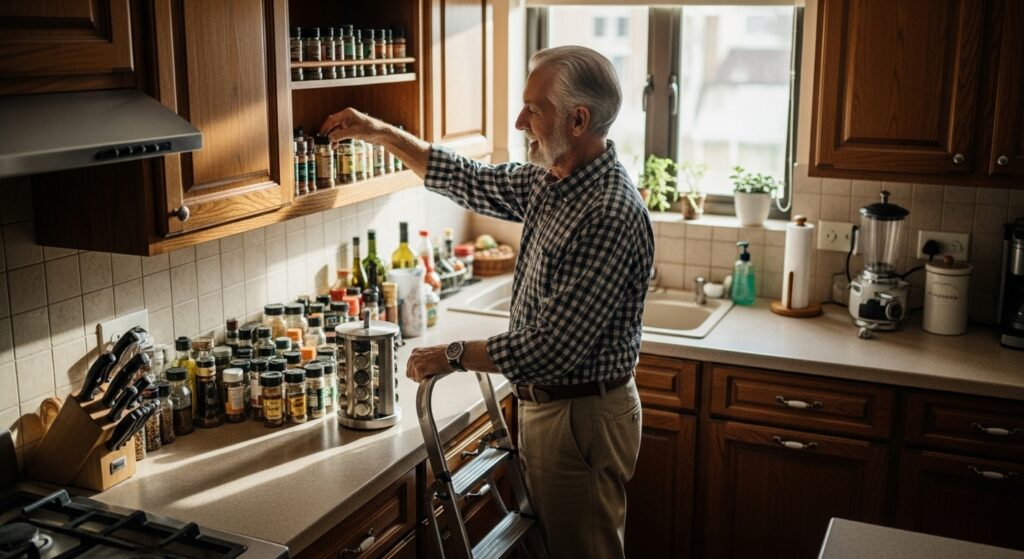
Ask for Help When Needed
It’s perfectly okay to ask for help when cleaning feels overwhelming. Whether it’s family, friends, or professional cleaners specializing in senior care, getting assistance can make a big difference. Help reduces physical strain and stress, allowing seniors to maintain a cleaner home without risking their health.
Professional cleaning services understand the unique needs of seniors and can provide tailored support, making house cleaning easier and safer. Remember, accepting help is a smart way to keep your home comfortable and well-maintained.
Maintain a Healthy and Safe Environment
Keeping your home safe and healthy is just as important as keeping it clean. Regularly check smoke detectors and carbon monoxide alarms to ensure they are working properly, and replace batteries as needed. Good ventilation helps improve air quality, so open windows when possible or use fans to keep fresh air flowing.
Store cleaning products and medicines safely out of reach to avoid accidents. A well-organized and safe environment supports independence and peace of mind, especially for seniors managing their own households.
Bonus Tips: Simplifying Cleaning Tasks
Simplify your cleaning routine by using multi-purpose cleaners that work well on various surfaces, saving time and effort. Setting reminders or creating checklists can help keep you on track and ensure no task is forgotten.
Consider using technology like robotic cleaners or voice assistants to automate some cleaning chores and make life easier. These tools can be great helpers, especially when mobility or energy is limited, allowing you to maintain a clean home with less physical strain.
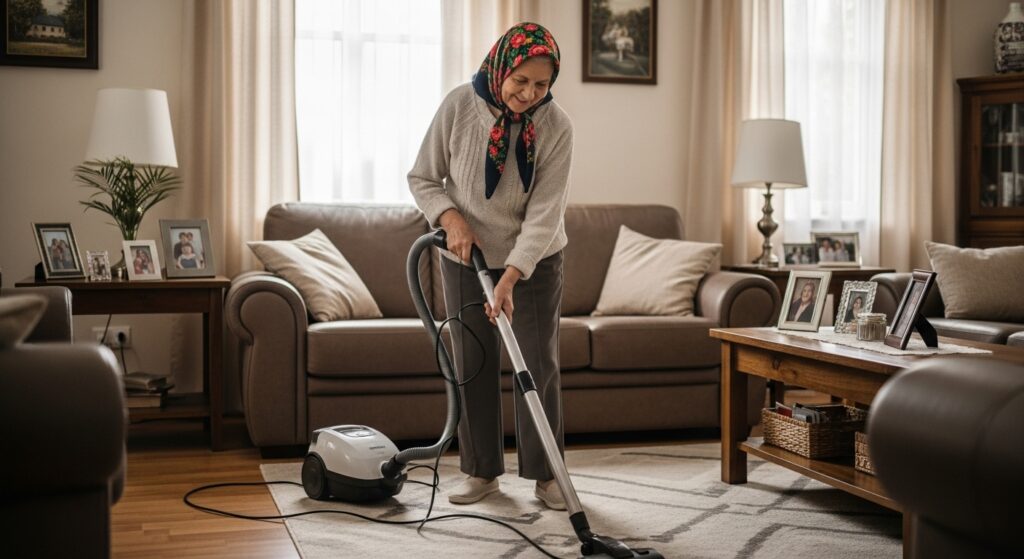
FAQ´s
- What are some easy cleaning tools for seniors to use?
Lightweight vacuums, extendable dusters, microfiber cloths, and robotic vacuum cleaners are great tools that reduce strain and make cleaning easier. - How often should seniors clean their homes to stay clutter-free?
Daily tidying like putting things away and wiping surfaces, combined with weekly deeper cleaning, helps prevent clutter buildup and keeps the home safe. - What safety precautions should seniors take while cleaning?
Wearing non-slip shoes, using grabber tools instead of ladders, keeping pathways clear, and taking regular breaks can reduce the risk of accidents. - When should seniors ask for help with cleaning?
If a task requires heavy lifting, bending, or reaching high places, it’s safer to ask family, friends, or professional cleaning services for assistance. - How can seniors keep their cleaning routine manageable?
Breaking tasks into small daily or weekly sessions and using simple tools and checklists can make cleaning less overwhelming. - What are key areas seniors should deep clean regularly?
Focus on the kitchen (fridge, pantry), bathroom (toilet, shower, mirrors), and living spaces (carpets, upholstery) to maintain a healthy environment.

